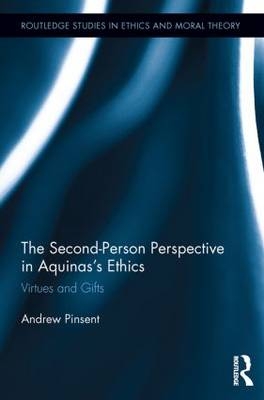
The Second-Person Perspective in Aquinas’s Ethics
Virtues and Gifts
Seiten
2013
Routledge (Verlag)
978-0-415-73617-6 (ISBN)
Routledge (Verlag)
978-0-415-73617-6 (ISBN)
This book advocates a new understanding of Aquinas’s virtue ethics, based not on the ideals of classical antiquity articulated by Aristotle, but on situations involving an irreducible "I-you" relationship. This understanding promotes a shift in the explanation of character development from the first person to second-person relatedness.
Thomas Aquinas devoted a substantial proportion of his greatest works to the virtues. Yet, despite the availability of these texts (and centuries of commentary), Aquinas’s virtue ethics remains mysterious, leaving readers with many unanswered questions.
In this book, Pinsent argues that the key to understanding Aquinas’s approach is to be found in an association between: a) attributes he appends to the virtues, and b) interpersonal capacities investigated by the science of social cognition, especially in the context of autistic spectrum disorder. The book uses this research to argue that Aquinas’s approach to the virtues is radically non-Aristotelian and founded on the concept of second-person relatedness.
To demonstrate the explanatory power of this principle, Pinsent shows how the second-person perspective gives interpretation to Aquinas’s descriptions of the virtues and offers a key to long-standing problems, such as the reconciliation of magnanimity and humility. The principle of second-person relatedness also interprets acts that Aquinas describes as the fruition of the virtues. Pinsent concludes by considering how this approach may shape future developments in virtue ethics.
Thomas Aquinas devoted a substantial proportion of his greatest works to the virtues. Yet, despite the availability of these texts (and centuries of commentary), Aquinas’s virtue ethics remains mysterious, leaving readers with many unanswered questions.
In this book, Pinsent argues that the key to understanding Aquinas’s approach is to be found in an association between: a) attributes he appends to the virtues, and b) interpersonal capacities investigated by the science of social cognition, especially in the context of autistic spectrum disorder. The book uses this research to argue that Aquinas’s approach to the virtues is radically non-Aristotelian and founded on the concept of second-person relatedness.
To demonstrate the explanatory power of this principle, Pinsent shows how the second-person perspective gives interpretation to Aquinas’s descriptions of the virtues and offers a key to long-standing problems, such as the reconciliation of magnanimity and humility. The principle of second-person relatedness also interprets acts that Aquinas describes as the fruition of the virtues. Pinsent concludes by considering how this approach may shape future developments in virtue ethics.
Andrew Pinsent is Research Director of the Ian Ramsey Centre for Science and Religion, University of Oxford.
1. The Mystery of Aquinas’s Virtue Ethics 2. The Gifts as Second-Personal Dispositions 3. Virtues and the Second-Person Perspective 4. The Fruition of the Virtues and Gifts 5. Conclusions and Implications
| Erscheint lt. Verlag | 11.11.2013 |
|---|---|
| Reihe/Serie | Routledge Studies in Ethics and Moral Theory |
| Verlagsort | London |
| Sprache | englisch |
| Maße | 152 x 229 mm |
| Gewicht | 249 g |
| Themenwelt | Geschichte ► Allgemeine Geschichte ► Mittelalter |
| Geisteswissenschaften ► Philosophie ► Ethik | |
| Geisteswissenschaften ► Philosophie ► Philosophie Altertum / Antike | |
| Geisteswissenschaften ► Philosophie ► Philosophie des Mittelalters | |
| Geisteswissenschaften ► Religion / Theologie | |
| ISBN-10 | 0-415-73617-X / 041573617X |
| ISBN-13 | 978-0-415-73617-6 / 9780415736176 |
| Zustand | Neuware |
| Haben Sie eine Frage zum Produkt? |
Mehr entdecken
aus dem Bereich
aus dem Bereich
eine neue Geschichte des Mittelalters
Buch | Hardcover (2023)
C.H.Beck (Verlag)
38,00 €


